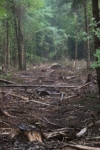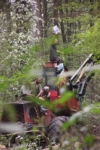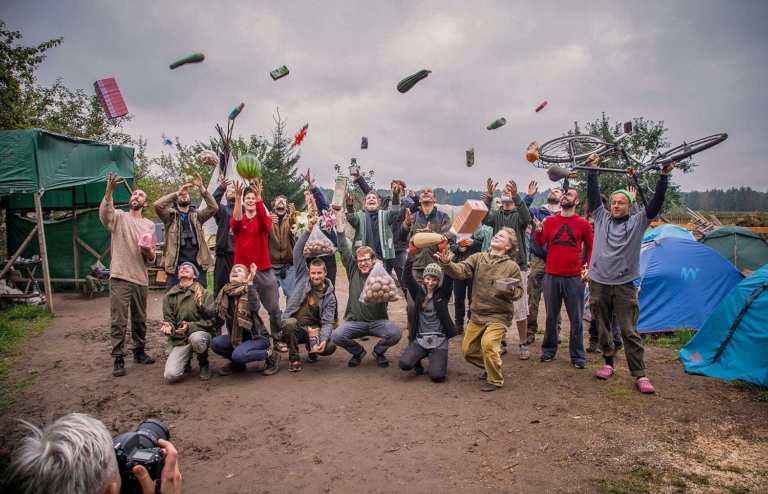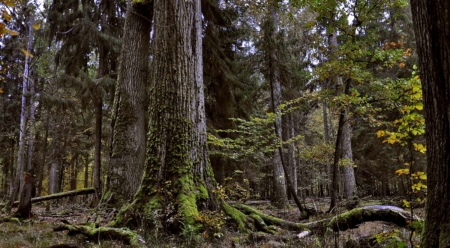What’s Up in Białowieża Forest?
The year 2017 is a special one for the Białowieża. After over 20 years of campaigning for protection of this unique forest in Poland, with some small successes along the way, the situation has taken a dramatic turn. The last primeval forest of lowland Europe—a UNESCO World Heritage site, a captivating wilderness and home to half of all European bison—is being devastated on an enormous scale.
The original excuse for the logging was an outbreak of the spruce bark beetle, which meant a mass dying of the spruces caused by an invasion of these tiny pests. In a primeval forest, such an outbreak happens every 10 years or so. The current one is very big, due in part to climate change (warmer winters, drier summers) and lower levels of the groundwater. The range of the spruces is retreating toward the north, where conditions are more suitable. And the spruce bark beetle is accelerating this process. This does not mean that there will be no spruces in the Białowieża Forest, but it means there will be fewer of them.
Decaying spruce trees provide a habitat for numerous species of mosses, bugs, birds and other animals, which find it difficult to survive in a typical forest-plantation. Such wild scenery is where the three-toed woodpeckers and Eurasian pygmy owls are thriving. Deadwood is also a key element for forest regeneration, serving as a kind of natural fertilizer for future generations of trees. However, for State Forest Authorities, it mostly means timber and, consequently, money: Each spruce could be sold for 100–200 euros, to later be transformed into pallets.
This is the reason why—for the first time in history—mechanical harvesters were hauled into this primeval forest. Each of those heavy-duty machines is capable of logging, cutting into pieces and stripping the bark from 300 trees a day! Currently there are five harvesters operating in the Białowieża Forest. The longer the beetle-infected trees stay in the forest, the less they’re worth, which is the reason for the hurry. What’s more, the harvesters have entered the most precious parts of the forest—home to stands of 100-year-old trees. It is those tree-stands that make the Białowieża Forest so unique. Until now, they were not subject to modern forestry, which means tree logging, plowing the soil and planting new seedlings. The Białowieża Forest constitutes just 0.6% of all Polish forest and is the last one that was not created through such a process. Forestry leads to a radical discontinuation of natural processes that have sustained this forest for over 12,000 years.
And this is happening now. In front of our very own eyes.

After the harvester. Photo: Marcin Nowak
Since the beginning of 2017 around 150,000 trees have been cut down in the Białowieża Forest. If laid in a straight line, they would reach from Moscow all the way to Madrid. Many of these trees had already been killed by the spruce bark beetle, but there was still plenty of life in them, including almost-extinct species of beetles, fungi and lichens. Some of the trees are being logged only because they stand in the way of the harvesters. Others have been damaged or broken because the logging is being done quickly, rather than carefully. The forest soil, which is a complex system that has been forming for thousands of years (where fungi, microorganisms, bugs and plants coexist), is being compacted and destroyed by the huge wheels of the harvesters.
Many people can’t stay idle, looking at the irreversible destruction of this unique common good. That’s how a social movement in defense of the Białowieża Forest began. When petitions, pleas, demonstrations and scientific arguments against illegal logging proved insufficient, direct action was taken. The first blockade took place on the 24th of May. Soon after, Obóz dla Puszczy (the Camp for the Forest) was created to foster peaceful actions taken up in defense of the forest. We are a grassroots, democratic, independent initiative united in the name of a common goal: stopping the devastation of the forest and protecting its whole area as a National Park. (Currently only 17% of the Polish part of the forest is under strict protection as a national park, however, the entire forest is a UNESCO heritage site.) Since then, over 20 blockades of destructive machines have taken place to stop the logging and the removal of wood from the forest. Activists are blocking the machines with their own bodies by pinning themselves to the harvesters or sitting in their way, making it impossible to pass. Apart from the blockades, activists of the Camp for the Forest are continuously on-site to document and publicize the illegal actions taking place in the Białowieża Forest.

Blocking the harvester. Photo: Marcin Nowak
The peaceful protests have been met with harsh reactions from the Forest Rangers, which are growing in brutality. The State Forest has brought in over 70 additional rangers—normally there are no more than 10-15 of them in the whole forest—with the sole purpose of fighting the peaceful protests and ensuring the continuity of logging. Over the last few months, activists have experienced numerous physical assaults, handcuffing, hate speech and sexism. A few activists have been taken to the hospital directly from blockades with various injuries that resulted from the Rangers’ intervention.
The Director of the State Forest, the Minister of Environment and the media working with them are officially calling the peaceful protestors eco-terrorists, green Nazis, neo-communists, etc. The Camp for the Forest has been raided for drugs by a police narcotics unit after a series of anonymous denunciations (nothing was found). Over 100 activists were subpoenaed and are facing large fines or incarceration. All of this is intended to silence the protests and divert attention from the real problem: illegal logging of the last primeval forest.

In the beginning, Camp for the Forest was just a few people in tents and a shabby barn in one of the villages in the middle of the forest. The next few months saw around 1,000 people coming to get involved, with some of them still on-site, now living in a former school building in another village. Throughout the whole period, self-organized Forest Patrols have been documenting illegal activities undertaken by the State Forest Authorities, to raise awareness of the general public and to provide evidence of lawbreaking. Photo: Gutek Zegier
The actions undertaken by the State Forest are breaking a multitude of laws and regulations:
- As a UNESCO heritage site, the majority of the Białowieża Forest area is exempted from logging.
- The intensive logging took place during the birds’ breeding season, leading to the destruction of multiple nests.
- The Białowieża Forest is part of the EU-wide Natura 2000 network, and its management plan puts the decaying wood under special protection—the very wood that is now being removed from the forest on a large scale.
- On July 27, the EU Court of Justice ordered an immediate halt to the logging; nonetheless, it has continued. It’s the first time a member state is not respecting the Court’s order. As a result Poland is facing severe financial fines that will impact all citizens; the decision is to be made in coming weeks.
Although winter is coming, the Camp stays on-site to continue monitoring and documenting all illegal actions as well as working to bring the devastation to a halt. The goal is simple: to protect the entirety of the Białowieża Forest as a national park.
In a bit of good news, the European Court of Justice recently ordered Poland to stop logging in the Białowieża forest—a UNESCO World Heritage Site that is also protected by EU nature laws—or face a daily penalty. According to Politico EU: “If Poland is found to have infringed this order, the court will order it to pay to the Commission a penalty payment of at least €100,000 per day.”
For more information and to get involved, please visit save-bialowieza.net. To show your support for Camp the Forest and the other forest defenders as they continue to face harassment, fines, court cases and physical violence, sign this open letter to the activists. To support Camp for the Forest with a donation, please visit their crowdfunding page.

